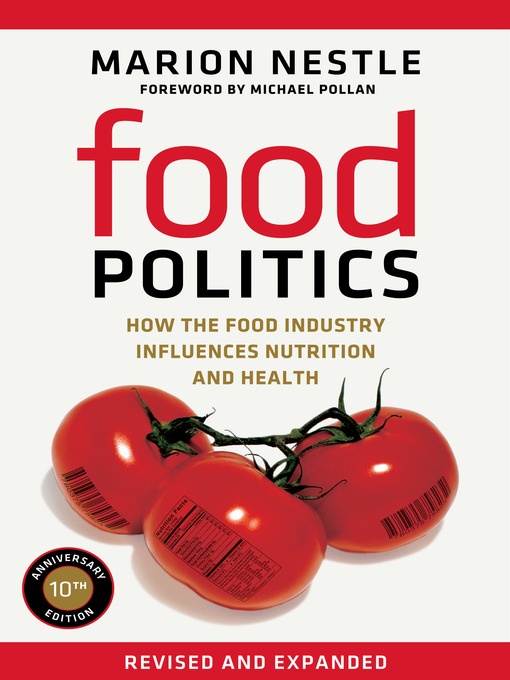Like manufacturing cigarettes or building weapons, making food is big business. Food companies in 2000 generated nearly $900 billion in sales. They have stakeholders to please, shareholders to satisfy, and government regulations to deal with. It is nevertheless shocking to learn precisely how food companies lobby officials, co-opt experts, and expand sales by marketing to children, members of minority groups, and people in developing countries. We learn that the food industry plays politics as well as or better than other industries, not least because so much of its activity takes place outside the public view.
Editor of the 1988 Surgeon General's Report on Nutrition and Health, Nestle is uniquely qualified to lead us through the maze of food industry interests and influences. She vividly illustrates food politics in action: watered-down government dietary advice, schools pushing soft drinks, diet supplements promoted as if they were First Amendment rights. When it comes to the mass production and consumption of food, strategic decisions are driven by economics—not science, not common sense, and certainly not health. No wonder most of us are thoroughly confused about what to eat to stay healthy.
An accessible and balanced account, Food Politics will forever change the way we respond to food industry marketing practices. By explaining how much the food industry influences government nutrition policies and how cleverly it links its interests to those of nutrition experts, this path-breaking book helps us understand more clearly than ever before what we eat and why.
-
Creators
-
Publisher
-
Release date
June 24, 2013 -
Formats
-
Kindle Book
-
OverDrive Read
- ISBN: 9780520955066
-
EPUB ebook
- ISBN: 9780520955066
- File size: 14509 KB
-
-
Languages
- English
-
Reviews
-
Booklist
March 15, 2002
For decades, the American food industry struggled to provide enough sustenance to keep Americans alive and healthy. By the end of the twentieth century, they had succeeded in producing and distributing not only more than enough to feed Americans, but enough to turn America into the world's breadbasket. Their success should be a cause for rejoicing, but at the beginning of the twenty-first century, success appears to be turning to tragedy. Americans die from eating too much food and the wrong kinds of it. The food industry, blinded to any concerns beyond short-term profits, preys on its customers with advertising, corrupts the political process, and manipulates the very nature of what people desire to eat. Nestle has thoroughly and carefully documented the food industry's unholy influence over public- health policy. Many people's lives and livelihoods are at stake in the conflict Nestle illuminates, and it will take scientific knowledge, political wisdom and leadership, enlightened and ethical corporate management, and consumer education to produce a positive outcome.(Reprinted with permission of Booklist, copyright 2002, American Library Association.) -
Library Journal
Starred review from February 15, 2002
Nestle (chair, nutrition and food studies, NYU) offers an expos of the tactics used by the food industry to protect its economic interests and influence public opinion. She shows how the industry promotes sales by resorting to lobbying, lawsuits, financial contributions, public relations, advertising, alliances, and philanthropy to influence Congress, federal agencies, and nutrition and health professionals. She also describes the food industry's opposition to government regulation, its efforts to discredit nutritional recommendations while pushing soft drinks to children via alliances with schools, and its intimidation of critics who question its products or its claims. Nestle berates the food companies for going to great lengths to protect what she calls "techno-foods" by confusing the public regarding distinctions among foods, supplements, and drugs, thus making it difficult for federal regulators to guard the public. She urges readers to inform themselves, choose foods wisely, demand ethical behavior and scientific honesty, and promote better cooperation among industry and government. This provocative work will cause quite a stir in food industry circles. Highly recommended. Irwin Weintraub, Brooklyn Coll., NYCopyright 2001 Library Journal, LLC Used with permission.
-
Loading
Why is availability limited?
×Availability can change throughout the month based on the library's budget. You can still place a hold on the title, and your hold will be automatically filled as soon as the title is available again.
The Kindle Book format for this title is not supported on:
×Read-along ebook
×The OverDrive Read format of this ebook has professional narration that plays while you read in your browser. Learn more here.


